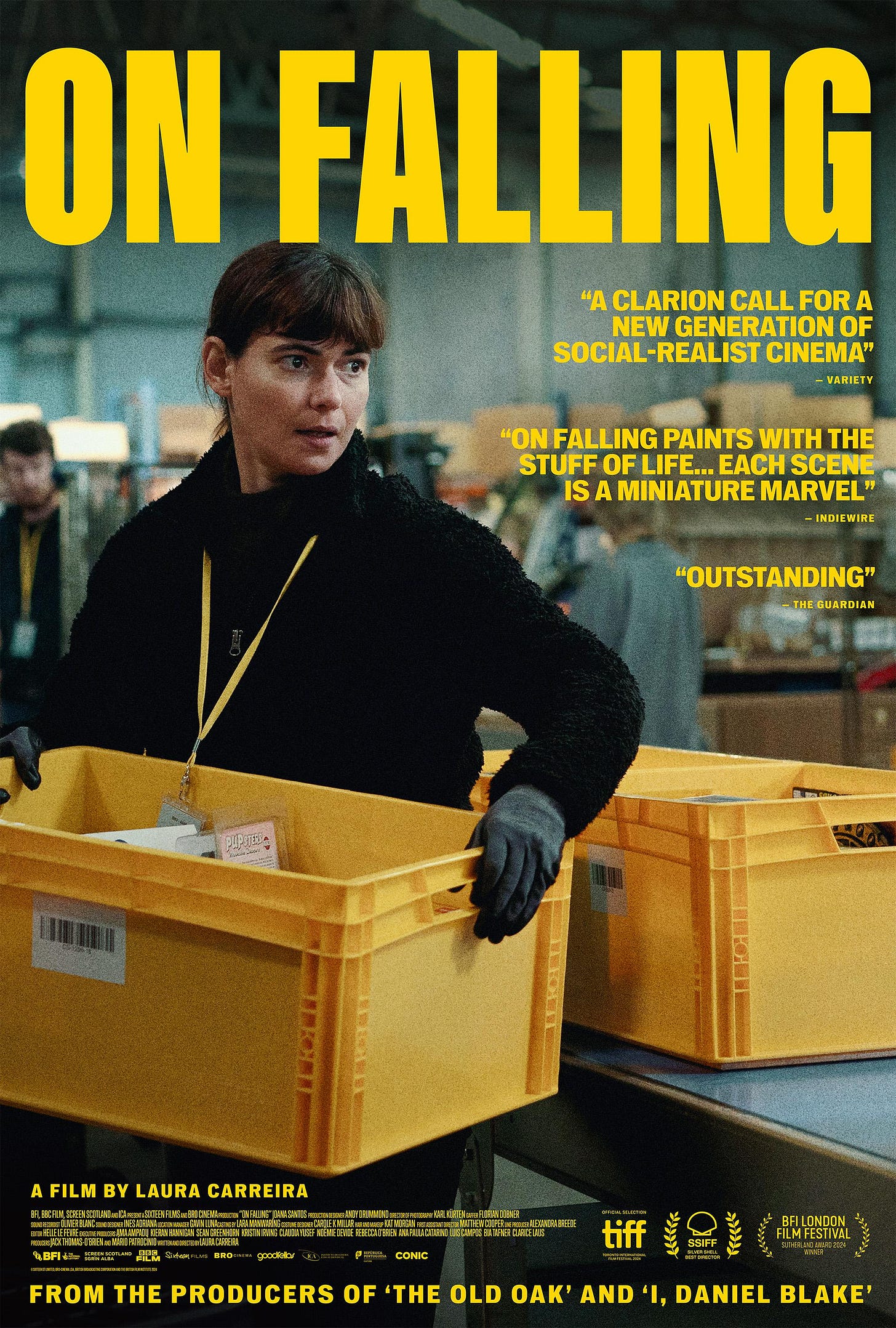The Poetry Rings True - Reviews Of Shifty (Adam Curtis; 2025), On Falling (Laura Carreira; 2024) & Incendies (Denis Villeneuve; 2010)
Adam Curtis’ Shifty (a new, five-part documentary currently on the BBC iPlayer) begins with a sequence of Jimmy Savile taking some children to No. 10 Downing Street for a tour conducted by Margaret Thatcher. In many ways, this sums up the strengths, the shortcomings and the occasional weirdness of the series as a whole. As an opening gambit, it’s bold, disturbing and compelling. However, it also assumes a good deal of prior knowledge on the part of the audience; not once do we get a voiceover or some on-screen text explaining why a shot of Savile acting as pied piper to a group of kids is problematic. And the role this moment plays in the series’ bigger picture isn’t entirely clear. As the episode progresses, we begin to conclude that it may relate to themes of venality, fakery and authoritarianism — the backdrop of all five instalments — but precisely what Curtis is trying to say through it is up for debate.
The rest of Shifty is very much in this vein, with the one key difference being that it occasionally treat us to some striking, block-capital captions. Via remarkable footage of, amongst many other things, a dog supposedly undergoing a spontaneous sex change, Trevor Horn producing Relax for Frankie Goes To Hollywood, an excited Peter Mandelson phoning Tony Blair to tell him he’s going to love the soon-to-be-opened Millennium Dome, Mohamed Al-Fayed admitting to bribing British politicians (“they’re the trash of the trash”) and staff at a zoo inflicting a traumatic, budget-cut-prompted separation on some elephants, Curtis presents an extended argument about… well, yes, what exactly?
As far as I can see, most reviews of the series have stopped short of making clear assertions about the points Curtis is attempting to convey, as though their authors were worried they were going to be told off by teacher for getting the answers wrong. It’s a shame, because a braver critical discourse might have resulted in a useful appraisal of what is undoubtedly a serious-minded piece of work; it might have offered some helpful challenges to the claims being put forward across the five episodes. Mind you, to a great extent, Curtis’ style seeks and invites an ambivalent response — some of his juxtapositions and conceptual leaps are, to say the least, unexpected — so perhaps it’s no surprise that his latest work appears to have left many writers nonplussed.
Then again, as T S Eliot once wrote, “genuine poetry can communicate before it is understood.” And as Shifty most certainly counts as a singularly poetic documentary, perhaps the wisest way to receive it is simply to allow the cumulative effect of its footage to communicate something, before seeking hard and fast meanings. And what is it that it communicates? Well, as it moves from the late 1970s through to the 1990s, its overriding idea seems to be that we’ve all been had. During this time period, politicians have tried to hold on to power by, paradoxically, giving up a good deal of it to financial institutions. The resultant free-flow of money (ie loans) has allowed those in poverty to convince themselves that they’re not poor at all. Those who are genuinely wealthy have become wealthier still. Meanwhile, the world has become more and more fake: a territory in which it is becoming increasingly impossible to trust anyone or believe anything. And even though the rage building up in ‘ordinary’ people, as a consequence of all that is happening around them, seems to be growing, it is being kept in check through the mollifying effect of the scraps that are being thrown at us — as though we’re the Proles in 1984 — by our supposedly generous masters.
Does that sum it all up? I can’t say for certain, because the trouble with a style like Curtis’ is that it’s so idiosyncratic, and uses footage that is frequently so bizarre, you could easily imagine the very same shots and sequences telling a different story if they’d been edited and presented in a different way. Then there’s the not-unreasonable objection that, surely, we’ve always had cynical politicians. We’ve always had corruption. We’ve always had greed. These weren’t ills invented in the final decades of the 20th century by The Milk Snatcher. Or perhaps Curtis believes that this sort of fatalistic, ‘things have always been awful’ attitude is precisely what The Powers That Be want us to believe, because it means we resign ourselves to a sense of helplessness, which makes it even easier for us to be controlled. Your guess is good as mine.
But putting aside all my doubts, all my confusion over frequent instances of what seem to be non-sequiturs, all my wondering about whether any of this stuff is actually as profound and original as its portentous soundtrack seems to want us to think it is, I found Shifty rather brilliant. I may not have understood everything it was trying to say, but I could not pull myself away from it, progressing from one episode to the next over the course of five evenings, like some lemming that knows very well it’s heading towards a cliff but finds itself unable to change direction. I was transfixed, baffled and ultimately convinced that what I was witnessing was some manner of truth, even though it wasn’t in a form that I could quite express in words. Do watch it if you can. And then come back and tell me what it’s all about.
It’s a shame Curtis stops Shifty at the Blair/Brown years, because it would have been fascinating to see what he makes of more contemporary woes, such as those portrayed in On Falling. Directed by Laura Carreira, it stars Joana Santos as Aurora, a Portuguese woman who has somehow wound up in Scotland and is trying to make ends meet by working at an Amazon-style warehouse. Kept to an inhuman pace by a viciously bleeping handheld device, she spends her days relieving shelves of various items — from books to dildos — and placing them in trolleys. In her free time, such as it is, she snatches moments of conversation with her housemates — whom she doesn’t see much anyway, as their work patterns are all different from hers — in between endless doom-scrolling on social media. One day, when she smashes her phone screen and has to have it repaired, the resultant financial hardship is so acute, she is forced to starve herself and steal food from others.
It’s a grim situation and it’s presented with great sensitivity, but the film’s purist adherence to social realism is perhaps the very factor that prevents it from taking flight and becoming truly memorable. The Ken Loach-esque portrayal of Aurora’s plight is so self-contained and prosaic, you wonder if it’s capable of having a lasting impact on the viewer.
Perhaps the film would have benefited from some of the decidedly less realistic flourishes to be found in Denis Villeneuve’s Incendies (2010). Before he became Mr Dune, Villeneuve gave us several lean, incisive pieces of work, including the sharp drug-thriller Sicario (2015) and the dreamy, gorgeously-designed sci-fi feature Arrival (2016). Incendies is one of his early efforts, a hard-hitting drama based on a play of the same name by Wajdi Mouawad.
In modern-day Canada, twins Jeanne and Simon have just lost their mother. In her will, their late parent has left them with a strange mission, which involves finding their father and their brother. They’re mystified, because they didn’t know they had a brother and they believed their father to be long-dead. What follows is a journey to the Middle East in which the siblings learn details about their mother’s past which they could never have imagined, and which have an unending impact on their own lives — revelations of traumas that run through and fall back on generation after generation of hapless sufferers.
One of Incendies’ strong points is that it never names its Middle Eastern location. The parallels between the situation in Israel, Palestine and Lebanon are obvious, but the non-specificity of the setting lifts the story out of simplistic politicking. It adds an almost mythical dimension to a tale that very much requires a stranger-than-life element if it is to make its final revelation as shocking and harrowing as it needs to be.
To his credit, Villeneuve achieves this tricky balancing act with extraordinary skill, delivering a closing act that is almost too painful to watch. The late, great Krzysztof Kieslowski once said that he moved from making documentaries to fictional films because the latter allowed him to be more truthful. One suspects that Villeneuve would agree with this statement, because it is precisely when Incendies is at its most poetic, its most fictional, that it manages to make the screen quake with the might of irrefutable truth.
Shifty, On Falling and Incendies — three very different attempts to penetrate and confront some very real, very difficult truths. Certainly, we need our artists to feel sufficiently free to pursue whichever truth-seeking method resonates most strongly with them. But speaking personally, I think an unconventional, off-centre approach is often most effective, which is why, out of these three, the one I’d most definitely consider re-watching is Shifty.
Dariush








